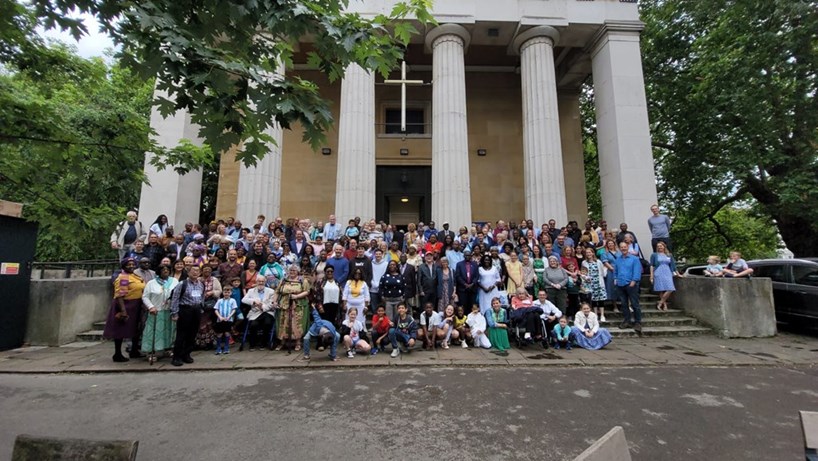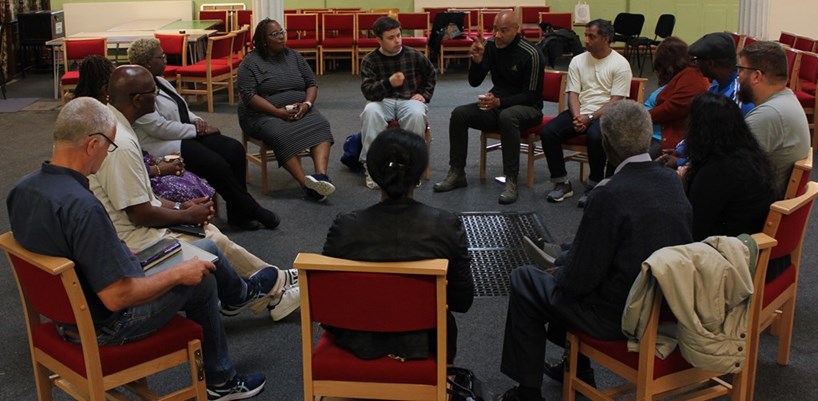CHURCHES have a valuable part to play in tackling violence among young people, says the Synergy Network, a coalition of churches, para-church groups, and Christian and other organisations engaged in drawing attention to the issue and finding solutions.
Government statistics show that there were 53,047 recorded knife-crime offences in England and Wales in the year ending March 2025. A survey of 10,000 young people, published last year by the Ben Kinsella Trust, a charity dedicated to tackling knife crime, found that two out of three felt anxious about knife crime in their area, and almost one quarter (24 per cent) believed that carrying a knife would protect them.
School summer holidays are often characterised by an upsurge in violence and potential danger, says the chair of Synergy, Bishop Lenford Rowe of the New Testament Church of God. “If we truly care about our young people, we need to get involved and be the change we want to see,” he suggested, before a weekend event in July. The gathering, “Standing Together”, sought to encourage congregations to explore the possibilities of using both their buildings and their volunteers to help keep vulnerable young people safe.
The churches were asked to commit themselves to 12 pledges, ranging from the spiritual — prayer-walking the streets where young people gathered, or committing the congregation to regular prayer — to the practical, such as investing in youth workers, opening their buildings, or running a youth-club hub or space.
The Synergy Network’s aim is “to encourage greater church participation and action”, and it has called on the Government to declare serious youth violence a public health issue. It warns: “The work to end this scourge will be long and arduous, but it is one that can be won, and one in which the churches must engage, alongside government, the police, civil-society organisations, and the community at large.”
THE Vicar of St Mark’s, Kennington, in south London, the Revd Stephen Coulson, is a board member of Synergy and feels strongly about its call for a coordinated and joined-up response to the problem of gangs and street violence.
He describes his parish as incredibly diverse. He says: “We have rich and poor and old and young, and it’s very vibrant. But young people face a lot of dangers. They have a fear of being in the wrong post code. They’re afraid of being found in the wrong place.”
His church partners with the Spear programme, which runs work-readiness courses for young adults aged 16 to 24. Mr Coulson describes the programme as transformational. “A lot of young adults are in families that haven’t worked for a generation or two. Work hasn’t really been in their consciousness,” he says. “It’s much more than just CV-writing and mock interviews: it’s a whole programme of challenging that sort of outlook on life.”
Street violence against young people can come to be considered unexceptional, “something they’ll experience, something that’ll happen in life”, he suggests. “The churches are wanting to say ‘No, this is abnormal, this is unacceptable.’ Every time there’s a tragedy, we need to flag it up. We need to help with memorials and we need to gather the community together and to grieve together — but also to say, ‘We’re not going to get used to it.’”
 St Mark’s, KenningtonThe congregation at St Mark’s, Kennington
St Mark’s, KenningtonThe congregation at St Mark’s, Kennington
Mr Coulson is motivated by encounters such as one that he had with a young man on a Spear course, who revealed that he wore a stab vest, because one of his friends had been stabbed, and he was “taking protection”; and by conversations with people who had said they couldn’t join a trip “because it will take me into Brixton or Stockwell, and I can’t go there”.
“The church is more and more thinking that we’ve got to become the alternative place of acceptance, where young people find identity,” he says. “We’ve got to positively reach out to say, ‘This is where you belong.’ Because I think those who get drawn into something, whether it’s county-lines drugs or gangs, do it out of a longing for acceptance and a longing for identity.
“We can’t just say, ‘It’s bad; it shouldn’t happen.’ The church wants to step into that space and be there as the place young people belong. That does require a cultural shift.”
Mr Coulson had just returned from taking 18 young people from the parish — some of whom had been with the church since childhood — to the five-day Christian festival Satellites, where the message had been about belonging and being valued.
Church involvement transcends churchmanship, he believes: St Mark’s, Kennington, is in the Evangelical tradition, and St John the Divine, Kennington, also fiercely committed to Synergy, is in the Anglo-Catholic tradition. St John’s, famous for casting its net wide for its youth choirs, which include 80 children (Features, 19 January 2024), runs a year-round after-school drop-in for young people, between the hours of 3 and 6 p.m.
The Revd Les Isaac, the founder of Street Pastors and president of the Ascension Trust, is a Synergy board member and a driving force in its ecumenical and partnership approach: “the real, authentic voice”, Mr Coulson says. Calling on the Government to do more to tackle knife crime, Mr Isaac told the “Standing Together” gathering: “Knife crime has caused our young people to walk the streets in fear. Many are also traumatised. The youth of the nation are looking to the Government to treat this issue with the urgency it deserves.
“The fact that legislation, increased policing, and implementing of community programmes have not stemmed the rise in knife crime signifies that we need a greater multifaceted approach to dealing with this issue.”
JOINT initiatives from Synergy have included placing amnesty bins in churchyards, something that has proved effective in encouraging people to give up their weapons. “It’s as much about the message [that] you’re much more at risk by carrying a knife. Young people can be deluded into thinking it’s for their safety, but it’s much more harmful,” Mr Coulson says.
The network recently had what it describes as a very fruitful meeting with Churches Together in Britain and Ireland (CTBI), one of whose leaders is Richard Reddie, Director of Justice and Inclusion, and also a Synergy board member.
He warns churches against seeking to “palm off” their responsibility to a youth-work organisation. “I would argue that violence against young people is a life-and-death issue,” he says. “If we truly care for human life and want to see it safeguarded, we have to participate in the work to end it.”
There is plenty of help there for churches that want to be involved but feel that they don’t have the expertise, he suggests. “I do believe that everyone should be interested in this matter. It’s not just for the few. We come up with all these vague platitudes about young people being the next generation of leaders, and then we don’t invest in them.
 Participants in the Synergy Network’s “Standing Together” event in July 2025
Participants in the Synergy Network’s “Standing Together” event in July 2025
“We know churches should invest more in youth workers, not just those who carry out the discipleship of young people in the church, but a hybrid or mixed model when they would also go out into the community and engage with young people who would never, or rarely, darken the church doors. There’s a real outreach dimension.”
Young lives can be turned round, he insists, citing Dez Brown as a perfect example. Mr Brown, who committed a violent offence for which he was imprisoned at the age of 17, went on to find faith, became an ordained minister, and has led a large and dynamic youth ministry in east London for 13 years. He is CEO and founder of the mentoring charity Spark2Life, which works with medium- to high-risk offenders, and was a member of the Archbishops’ Commission on Families and Households.
Mr Reddie is disappointed by the lack of any progress towards having serious youth violence declared a public-health issue rather than a law-and-order issue — “something we can police our way out of rather than something that you know clearly involves social work”, he suggests.
“People are losing their lives, tragically, and lives are being wasted and communities impacted,” he says. Sessions held by the Synergy Network have involved talking to mothers who have lost loved ones, and also those who have had loved ones go to prison.
“More often than not, it’s the church that picks up the pieces. It’s a heavy burden to carry, because everyone’s looking to the minister to be the source of assistance, the voice of caring. That’s a big weight to carry.”
The Church has to be prophetic, he says. “It has a moral responsibility. I’ve noticed Christians take to the streets for a whole range of things, but never for this. It looks as if we don’t care, but it’s life and death: it’s an existential issue.
“Any time a young person dies like that, it’s a tragedy. They should have been the next generation of lawyers, teachers, doctors and preachers. We should be able to celebrate them rather than grieving a life ended before its time.”














